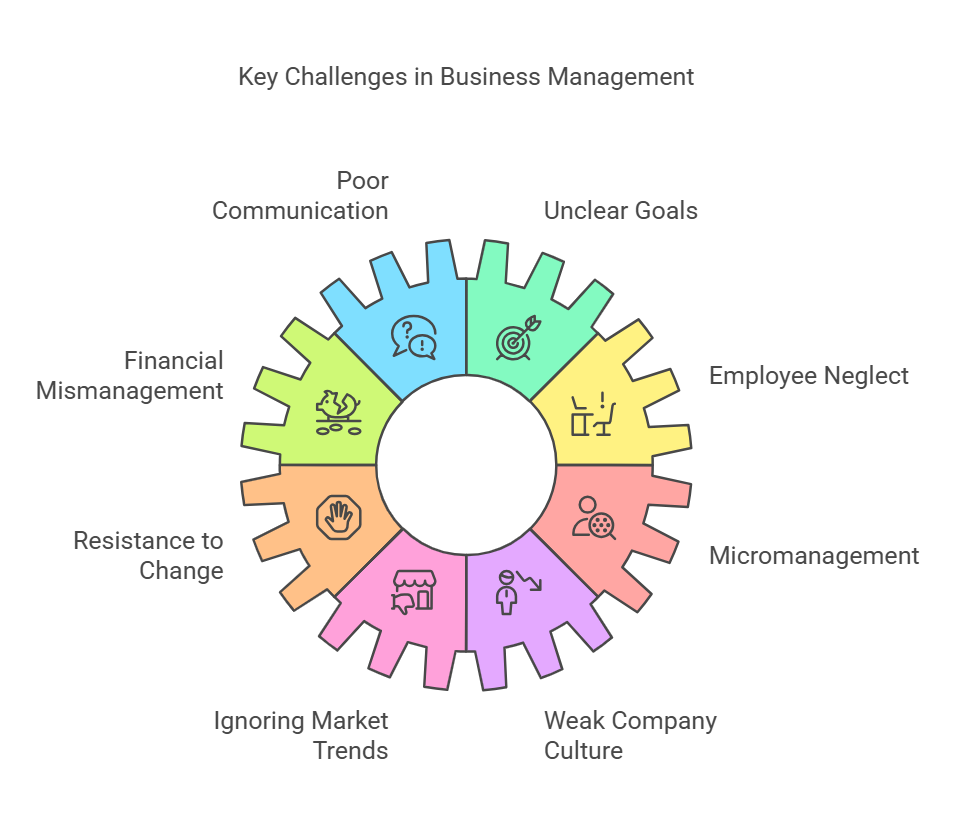 Running a business comes with challenges, and avoiding common business management mistakes is key to long-term success. However, even experienced leaders can overlook issues like poor communication or lack of planning. These mistakes often lead to inefficiencies, low morale, and missed opportunities.
Running a business comes with challenges, and avoiding common business management mistakes is key to long-term success. However, even experienced leaders can overlook issues like poor communication or lack of planning. These mistakes often lead to inefficiencies, low morale, and missed opportunities.
Additionally, neglecting innovation or failing to delegate responsibilities can slow growth and frustrate your team. By understanding these challenges, you can take steps to improve operations and build stronger relationships within your organization. Therefore, identifying and addressing management issues is an important part of creating a thriving business.
Poor Communication and Team Misalignment
Poor communication is one of the most common business management mistakes that can negatively affect team productivity and relationships. When communication lacks clarity, team members may misunderstand their roles or tasks, leading to missed deadlines and duplicated efforts. This not only creates inefficiencies but also fosters frustration within your team.
Additionally, unclear communication can lead to team misalignment, where goals and priorities are misunderstood. For example, when expectations are not clearly defined, employees may focus on tasks that do not align with business objectives. This misalignment often results in wasted resources and lost opportunities. Therefore, clear communication is essential for keeping everyone on the same page.
However, communication breakdowns can also affect external relationships, including those with clients or partners. Misunderstandings about deliverables or timelines can harm trust and damage business relationships. To avoid this, you should prioritize transparency and open dialogue with all stakeholders.
Improving communication begins with identifying gaps in your current processes. Regular team meetings, clear documentation, and active listening can help address these issues. Additionally, investing time in refining how you share information can lead to stronger collaboration and better results across your organization.
Lack of Clear Goals and Planning
Failing to set clear goals and long-term plans is one of the most common business management mistakes. Without measurable objectives, it becomes difficult to track progress or evaluate success. Teams may lack direction, leading to wasted time and resources on tasks that don’t align with business priorities. This lack of focus can slow growth and create unnecessary frustration for your team.
Additionally, the absence of long-term strategies leaves businesses unprepared for market changes or competitive challenges. When you fail to plan for the future, it’s harder to adapt to evolving trends or customer needs. This often results in missed opportunities that could have positioned your business for sustained success. Clear planning helps create a roadmap that keeps your team aligned and focused on achieving meaningful results.
However, unclear goals also affect decision-making at every level. Without a clear vision, it’s challenging to prioritize initiatives or allocate resources effectively. Employees may struggle to understand their roles, which impacts both productivity and morale. Therefore, setting specific, measurable, and achievable goals helps you guide your team and make informed decisions.
Establishing clear goals and planning effectively requires regular review and communication. By sharing your objectives with your team, you create a shared understanding of priorities. This alignment fosters accountability and provides a solid foundation for long-term growth. Taking the time to define and refine your goals can lead to greater success and fewer setbacks.
Ineffective Financial Management
Ineffective financial management is one of the most common business management mistakes that can jeopardize your company’s long-term success. Overspending often drains resources, leaving little room to invest in growth or respond to unexpected challenges. Without a proper budgeting process, you risk making decisions based on incomplete or outdated information.
Additionally, neglecting financial forecasting can make it harder to anticipate revenue fluctuations or plan for seasonal trends. Poor planning leads to cash flow issues, which can disrupt daily operations and delay payments to vendors or employees. Therefore, it’s important to regularly review your financial performance and adjust plans as necessary.
However, the consequences of poor financial management go beyond immediate operational issues. Over time, these missteps can damage your credit, making it harder to secure loans or attract investors. Additionally, a lack of financial oversight may cause you to miss opportunities for cost savings or higher returns. Clear financial strategies help you avoid these pitfalls and build a more stable foundation.
To manage finances effectively, you should prioritize transparency and regular reporting. By tracking expenses, revenues, and future projections, you can make more informed decisions. Financial discipline allows you to allocate resources where they are needed most, helping your business thrive even in uncertain times. Taking proactive steps now can reduce risk and improve long-term outcomes.
Neglecting Employee Development and Engagement
Neglecting employee development and engagement is one of the most common business management mistakes that can harm your organization. When employees feel undervalued or unsupported, their motivation and productivity often decline. This lack of engagement not only affects individual performance but also weakens overall team dynamics.
Additionally, failing to invest in employee growth can lead to higher turnover rates. When employees do not see opportunities for advancement, they are more likely to seek growth elsewhere. Replacing employees can be costly and time-consuming, making it harder for your business to maintain continuity. Therefore, fostering development and engagement is key to retaining top talent.
However, employee development is not just about training programs. It also involves providing clear feedback, recognizing achievements, and creating an inclusive work environment. When employees feel heard and appreciated, they are more likely to stay committed to their roles. This positive energy often translates into better collaboration and improved results.
To avoid these mistakes, you should focus on building a supportive culture. Regularly communicating with your team and identifying their needs can help you create meaningful development opportunities. Engaged and motivated employees are more productive and are likely to contribute to your business’s long-term success. By prioritizing their growth, you create a more resilient and dynamic workforce.
Resistance to Change and Innovation
Resistance to change and innovation is one of the most common business management mistakes that can hinder long-term success. Avoiding new technologies or market trends often puts businesses at a competitive disadvantage. Additionally, sticking to outdated processes can reduce efficiency and make it harder to meet customer expectations.
However, the risks of resisting change go beyond immediate setbacks. When businesses fail to adapt, they miss opportunities to improve products or services. This stagnation often leads to declining market share as competitors embrace innovation. Therefore, staying open to change is essential for maintaining relevance in a rapidly evolving environment.
Additionally, resistance to change can create a negative culture within your team. Employees may feel frustrated when their suggestions for improvement are ignored. Over time, this frustration can lower morale and reduce engagement. By fostering a culture that embraces innovation, you encourage creativity and collaboration within your workforce.
To overcome resistance, you should approach change as an opportunity rather than a threat. Communicating the benefits of new technologies or improvements helps build support within your team. Investing in training and resources can also ease transitions and encourage adoption. Adapting to change allows your business to grow, thrive, and remain competitive in an ever-changing market.
Micromanaging and Lack of Delegation
Micromanaging and a lack of delegation are common business management mistakes that can negatively impact your team’s efficiency and morale. When you try to control every detail, it limits your team’s ability to take ownership of their work. This approach often leads to delays, as employees wait for constant direction or approval before moving forward.
Additionally, micromanagement can erode trust between you and your team. Employees may feel undervalued or incapable when they are not given autonomy. Over time, this dynamic reduces motivation and can lead to higher turnover rates. Therefore, delegating tasks is essential to building a strong and independent workforce.
However, failing to delegate doesn’t just affect your team. It also prevents you from focusing on high-level responsibilities that drive business growth. When you spend too much time on small tasks, you may miss opportunities to plan strategically or address larger challenges. Delegating allows you to distribute workloads more effectively and prioritize your time.
To address this issue, you should focus on empowering your team with clear instructions and trust in their abilities. Additionally, providing guidance without constant oversight helps employees build confidence and develop their skills. By delegating effectively, you improve overall productivity and create a more collaborative and positive work environment. This balance is key to being an effective leader and achieving long-term success.
Conclusion
Addressing common business management mistakes is essential for building a successful and adaptable organization. Issues like poor communication, resistance to change, and ineffective delegation can significantly hinder progress. However, identifying these problems gives you the opportunity to implement solutions that improve efficiency and team morale.
Additionally, investing in employee development and clear financial planning helps lay a solid foundation for growth. These efforts can prevent many setbacks and promote a more resilient business. Therefore, you should regularly evaluate your management practices and make necessary adjustments. Small improvements can lead to substantial positive changes, ultimately supporting your long-term success.



